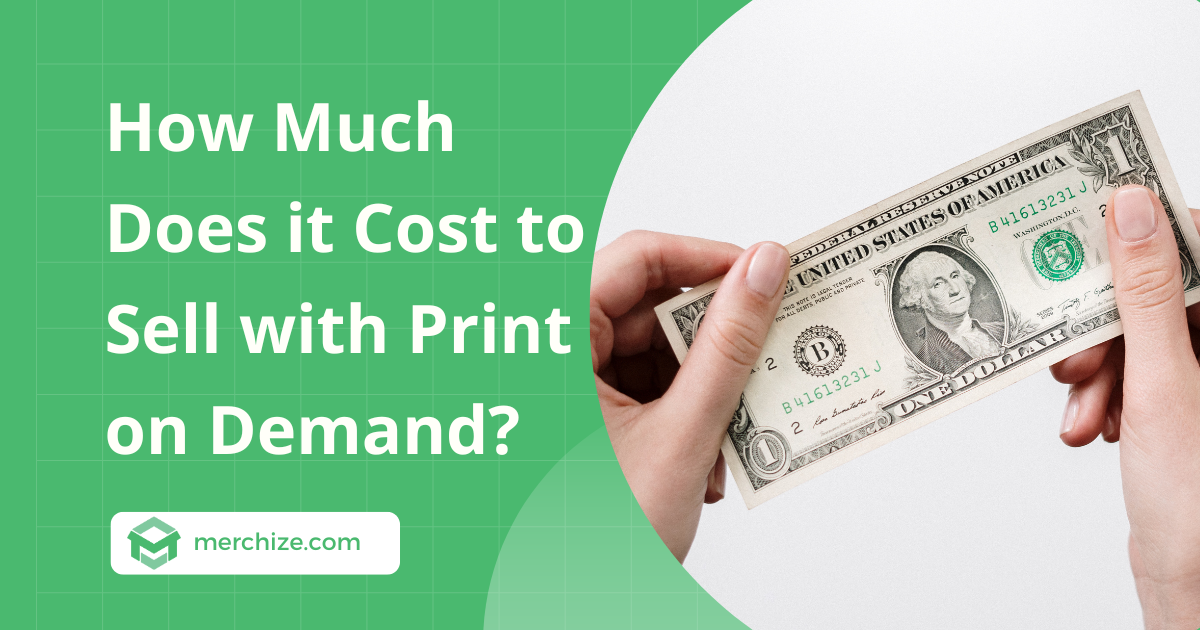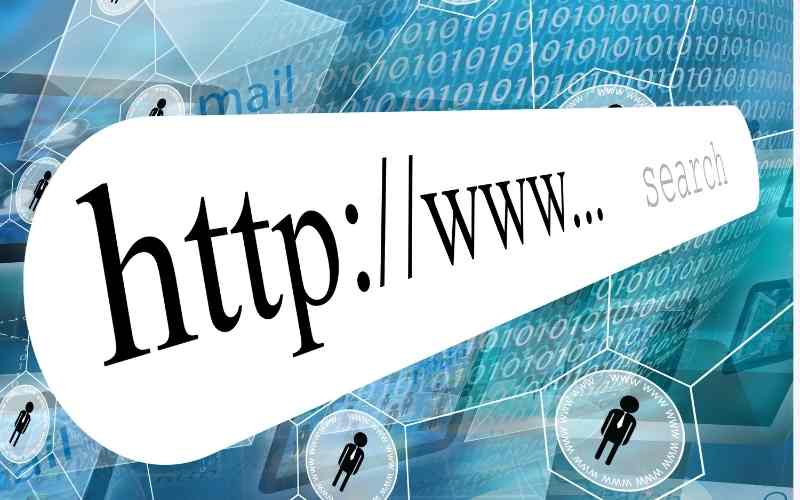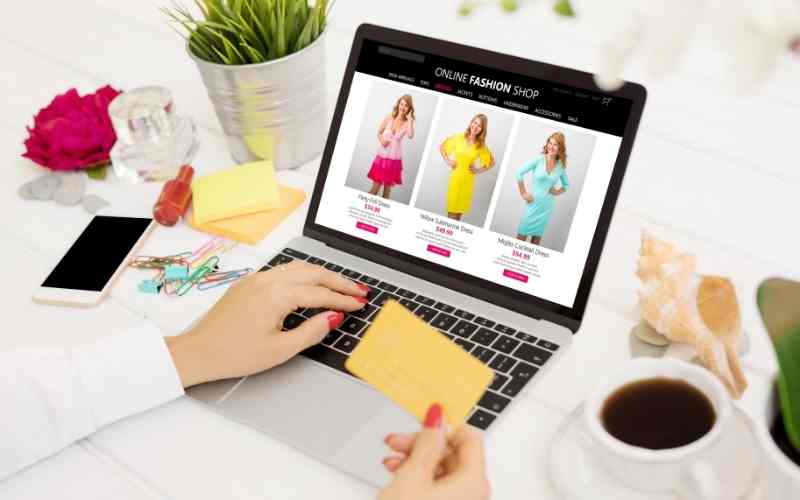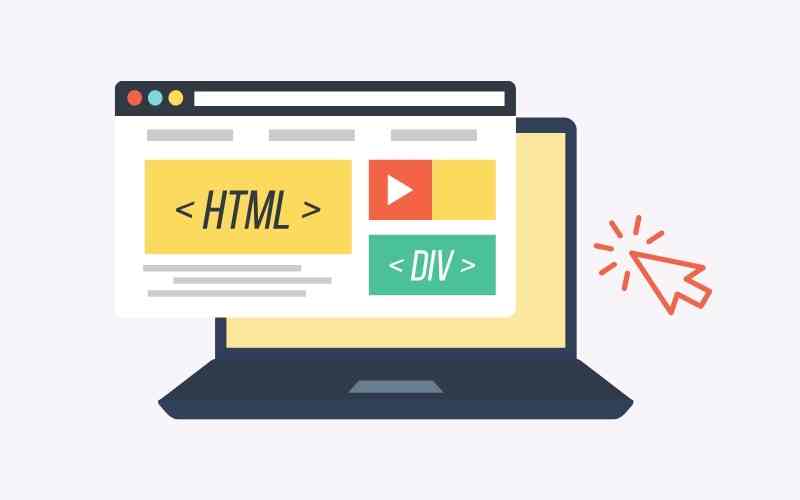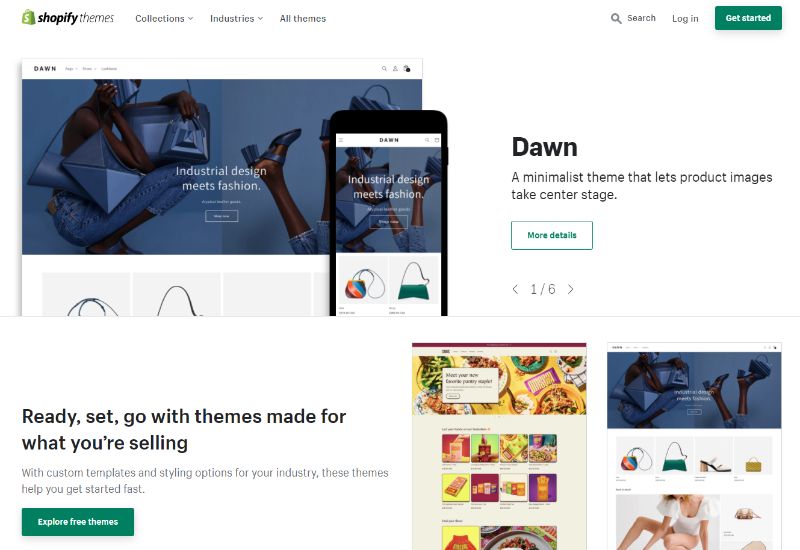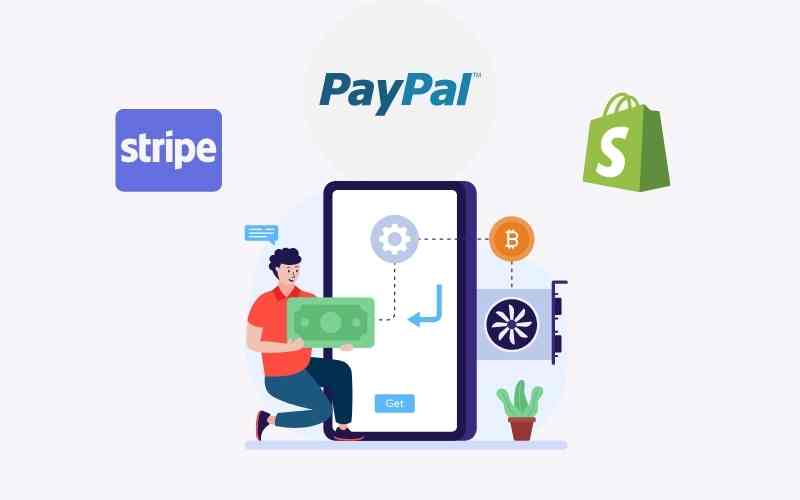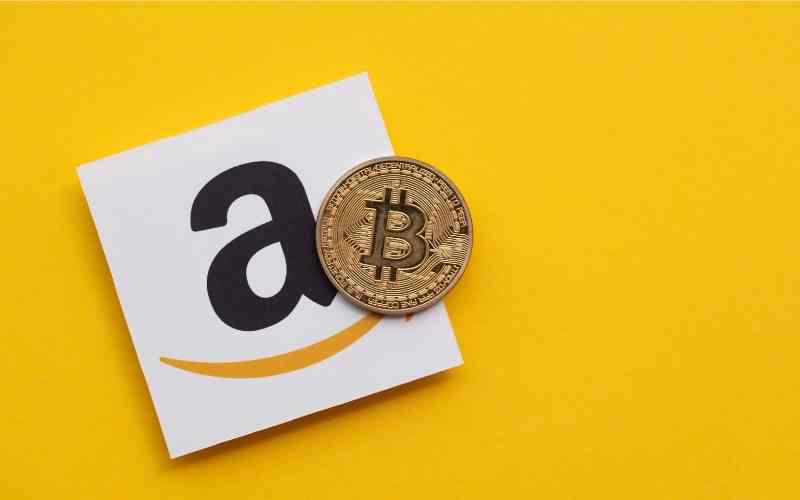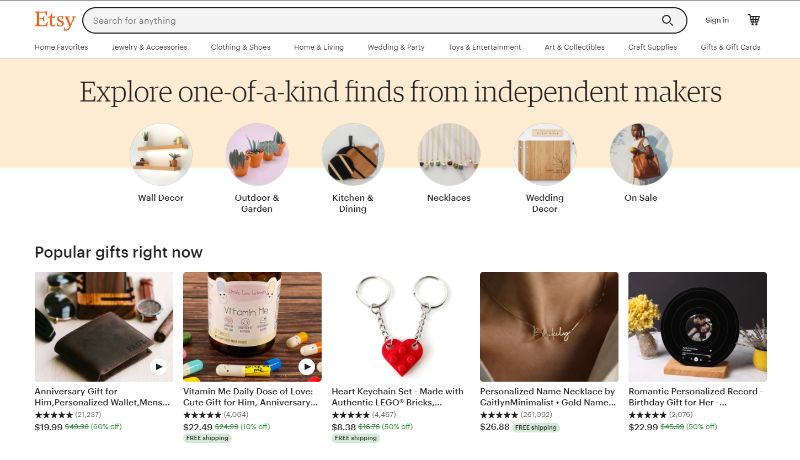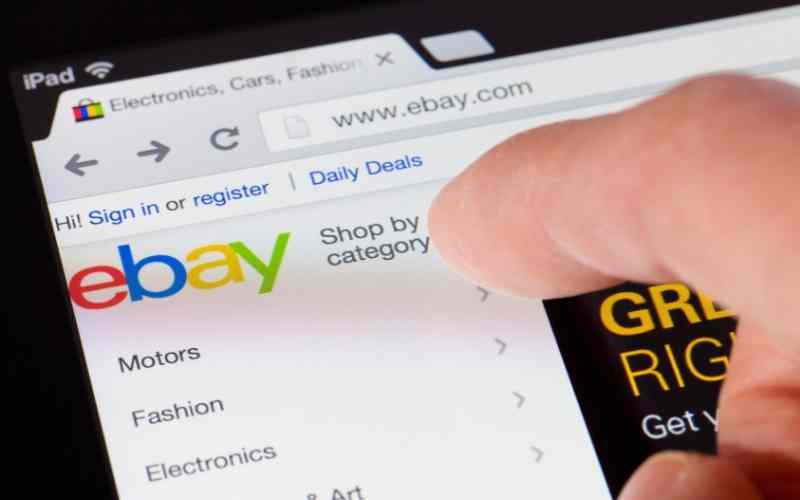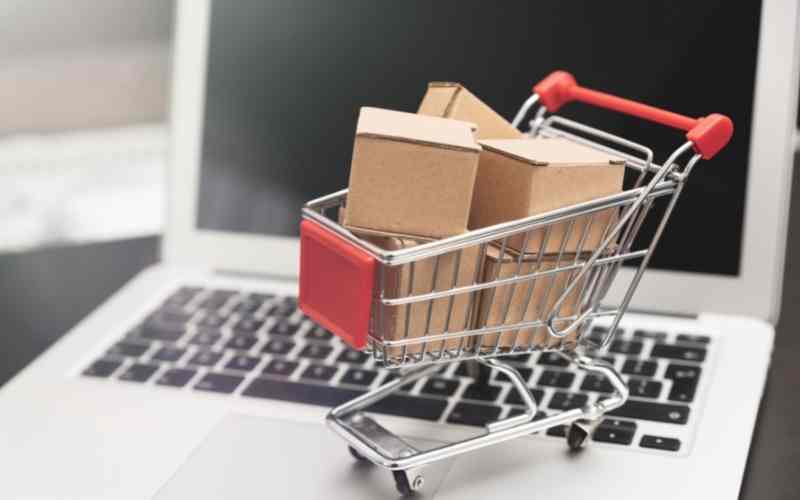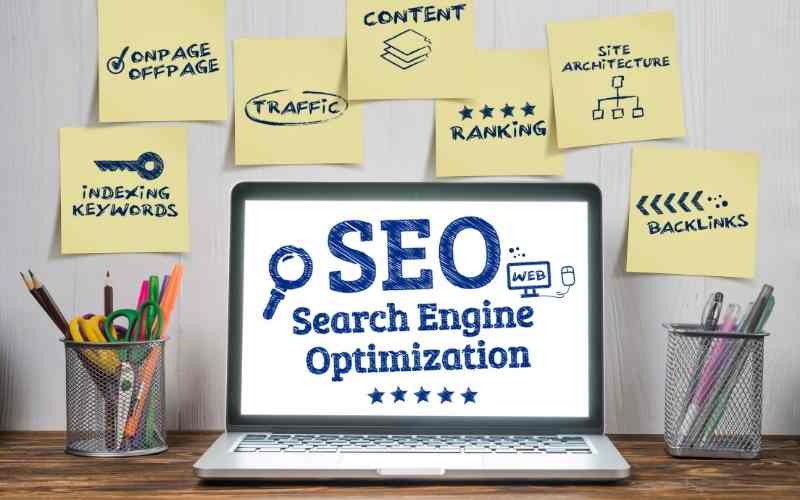Contents
One of the biggest draws of print on demand is the low entry bar. It requires no inventory, no upfront cost, and no minimum order. You can literally start selling with no investment. But is print on demand really a no-capital business? In this article, we will break down all the possible print on demand costs that you might have to spend in order to keep your business growing.
How much does it cost to register with print on demand companies?
One of the very first steps to start a print on demand business is to register service from a print on demand company.
Most print on demand companies do not charge you any fee in order to start fulfilling. They only charge you the product costs and shipping costs once an order arrives. You can pocket the price difference between what customers pay you and what you pay for the print on demand services.
Registration is free for almost all print on demand providers. Generally, you can start selling without paying any fee to the POD companies. Besides, you can also make use of some free built-in tools on their platforms like mock-up generators.
At Merchize, you can start fulfilling your print on demand products free of charge. Moreover, we provide a wide selection of products that are priced competitively with printing and cheap shipping fees. With our catalog, you can make the best out of your print on demand business.
Note that some print on demand suppliers might offer paid plans to sellers. These plans can include some benefits like discounts for large orders as well as access to other advanced marketing tools. Here are some examples:
Printful
- Basic plan: All the basic tools (Mock-up generator)
- Printful Plus: Background remover tool, Custom mockup market ($9/month for monthly subscription and $99/year for annual bill)
- Printful Pro: Keyword Scout, Getty Images, embroidery digitization, Promote maker($49/month for monthly subscription and $594/year for a full year)
Printify
- Free: Basic options (Mockup generator, fulfillment service)
- Premium: $24.99/month or $348/year (Up to 10 integrated stores, up to $20 discount on all products.
- Enterprise: Custom pricing (Unlimited stores, 20% discount)
If your print on demand business has taken off and garnered a good sale volume, you might consider switching to the paid plan. But if you just started out, there is no need to opt for the paid plan. A regular account can cover all the print on demand services that you need to start making profits.
How much does it cost to open a print on demand store?
The next step to establishing a print on demand business is to open your virtual store where customers can visit and buy your products. There are a number of ways to build an online store to sell print on demand products: You can create a store on your own domain or open a store on eCommerce platforms and marketplace.
1, Open an online store on your own website
Creating your own website to sell print on demand is the best option considering the future of your business. When selling products on your own domain, you have full control over the operation of your store and don’t have to rely on others.
It also offers the utmost power to customize the designs and optimize functions of your website to your liking, which will definitely strengthen your brand image.
The downside of opening your own ecommerce site is that you have to put more effort into maintaining your website and attracting visitors to your website. That being said, it remains to be the most beneficial in the long run.
In order to run an online store on your own domain, you need to cover the following cost.
Domain
Of course, to have a website on your own, you must buy the domain. A domain name that is unique to your online store is the very first step to establishing your brand in the ecommerce market.
You can buy the domain from the platform that you are using like Shopify, Woocommerce, Wix, Squarespace (which will be explained in detail in the next section). This way, you won’t have to take extra steps to connect your domain with your store.
But you can save a few dollars if you register your domain with other hosting companies like Bluehost, Siteground, GoDaddy, NameCheap, and Dreamhost.
Most domain providers offer a very good introductory price for domain registration. However, the price will go up over the years. On average, it might cost you around $15 per year to register a domain. It can go much higher if you are purchasing a domain from a private seller. Also, note that domain renewal can cost a higher amount of money.
Domain registration price can vary, depending on the domain name, suffix, and the providers. Here are the price lists from the popular domain providers for your reference.
| Provider | Registration Fee |
| Shopify | From $14/year |
| WordPress | From $9/year |
| Wix | From $14.95/year |
| Squarespace | From $20/year |
| Bluehost | From $12.99/year |
| Siteground | From $19.99/year |
| Godaddy | From $11.99/year |
| Namecheap | From $8.98/year |
| Dreamhost | From $7.99/year |
Hosting
Besides the domain, hosting is a necessity to operate an independent website. When it comes to hosting an ecommerce store, you have two choices, self-hosting or ecommerce website hosting.
Self-hosting is required if you are using Woocommerce, a free ecommerce software powered by WordPress. Some good options for hosting a Woocommerce website are Bluehost, Siteground, WPEngine.
The other option is hosting services from the ecommerce platform that you are using. Shopify or Bigcommerce all include hosting services on their plans, which means you don’t have to pay extra money to host the website.
Most of the hosting providers also include SSL certificates in their services. An SSL certificate is needed to encrypt sensitive data, credit card numbers for example, between the shopper’s browser and server. But some hosting companies might offer SSL certificates as an additional service which can cost from around $8 to $60-65 a year.
Ecommerce platform
The next step on the way to create a functional print on demand website is to choose an ecommerce platform, a place where you can build up your store quickly and easily. Woocommerce and Shopify are the two most popular choices among ecommerce sellers.
Each ecommerce platform comes with a different plan and pricing. Depending on your needs and your business, you can find one platform and plan that suits you best.
| Ecommerce platforms | Pricing |
| Shopify | Free trial: 14 days Basic Plan: $29/month Standard Plan: $79/month Advanced Plan: $299/month |
| Woocommerce | Free WordPress plug-in |
| Bigcommerce | Standard: $29.95/month Plus: $79.95/month (bill monthly)/ $71.95/month (bill annually) Pro: $299.95/month (bill monthly)/ $269.95/month (bill annually) |
| Wix | Business VIP: $35/month Business Unlimited: $25/month Business Basic: $17/month |
| Squarespace | Business: $33/month (bill monthly)/ $23/month (bill annually) Basic Commerce: $36/month (bill monthly)/ $27/month (bill annually) Advanced Commerce: $65 (bill monthly)(bill monthly)/$49/month (bill annually) |
Themes or store design
The last step of establishing an independent online store is furnishing and decorating. Each platform has a default look for all ecommerce stores yet, a general-looking design with no character is the last thing you want.
It is possible for you to do all simple customization using the web builder tools available on your chosen ecommerce platform. But in order to create a website with optimized UX and a unique, appealing UX as well as all the useful features and functions, you might need to source help from the professional.
You can hire designers and developers to build the site, but it will definitely cost you a fortune. If you hire a developer to code your website from scratch, it might cost from $1,000 to $15,000, depending on the developer’s rate and the complexity of your ecommerce site.
Most print on demand and ecommerce sellers will opt to use a premade template or theme for their store. This way, you can save a huge amount of money and time to create a good-looking and well-functioning website.
There are some free themes that you can install in your store. However, these free options have very limited room for customization as well as fewer features and functions. It is recommended to choose paid themes if you want a more customized look for your store as well as all the bells and whistles. Here are some places where you can find great paid themes
- Shopify theme store
- Themeforest
Paid themes on Shopify stores are usually more expensive than the themes available on other sources like Themeforest, TemplateMonster, etc. Shopify official themes can cost from $150 to over $300.
In the meanwhile, you can find a wide variety of themes for less than $100 on other sources.
Check out our list of Top 10 Best Shopify Themes for Print on Demand business in 2025.
If you want to cut down the expense as much as possible, consider using the available free theme on Shopify’s official theme stores. Avoid installing free themes from unverified sources. Free or null themes from other sources have a low level of security and privacy, which can expose your store to the threat of being attacked or hacked.
Even when you use precoded themes, you might need to hire developers to resolve technical issues of the website which you can’t handle yourself. Freelance developers usually charge by an hourly rate which can cost from as low as $10 to over $100.
Plugs in and apps
Now, you have a store that is functioning and good-looking. But to optimize the conversion rate, you must add more features to the store. Some of these useful features might have come along with the paid theme. And some others are available free of charge. Sometimes, you still need to pay to get the advanced functions for your store.
Payment gateway
A research by Baymard shows that 18% of the shoppers cite the concern about payment security as a reason to abandon carts.
Having a trustworthy payment gateway is a must for your online store if you don’t want to lose your customers at the very end of the conversion funnel.
With the exponential growth of the ecommerce industry, more and more payment methods, as well as payment gateways, are joining the race. Major ecommerce platforms also offer their own payment gateway. However, you can still opt to use other payment gateway services from third-party companies.
| Payment gateway | Fees |
|---|---|
| WooCommerce Payment | No setup charge, no monthly fee 2.9% + $0.30/transaction (US credit card) 4.9% + 0.30/transaction (non-US credit card) |
| Shopify Payment | Basic Shopify: 2.9% +$0.30/transaction Shopify – 2.6% + $0.30/transaction Advanced Shopify: 2.4% + $0.30/transaction |
| Bigcommerce Payment | Standard: 2.59% + $0.49/transaction Plus: 2.35% + $0.49/transaction Pro: 2.05% + $0.49/transaction Enterprise: 2.05% + $0.49 or lower/transaction |
| Paypal | Basic: No monthly fee (Transaction made on Paypal’s website) 2.9% + 0.3/transaction Paypal Pro: $30/month (Transaction made on your site) |
| Stripe | No setup charge, no money fee 2.9% +$0.30/transaction |
2, Sell print on demand on ecommerce sites
Building an ecommerce store can be complicated if you have just started doing online business. Fortunately, it is not the only way you can make money online with print on demand.
Instead of building an ecommerce website on your own, you can open a store via an ecommerce retailer. The three most popular options for print on demand businesses are Amazon, Etsy, and eBay.
It is easy to get started on these platforms. You don’t have to worry about buying a domain, hosting, or setting up your store. What you need to get your print on demand business going is to register as a seller on these online marketplaces and then connect your store to the print on demand provider of your choice. The best part is that you can make use of the huge number of existing buyers on these online markets.
Now, let’s walk through each of these options and see how much will it cost to get your
Amazon
Amazon is the biggest online retail platform in the world with over 300 million active users. Having a huge market and demand, Amazon has attracted a large amount of print on demand sellers to get on this platform.
Notably, there are many print on demand companies that offer integration to Amazon, enabling sellers to automate the fulfilling process for their Amazon store.
Amazon is offering two plans, Individual and Professional plans for sellers. Individual sellers will pay $0.99 per item sold while the Professional plan costs $39.99 per month.
In addition to the monthly fee, Amazon also charges sellers of both Individual and Professional store referral fees for each sold item. Referral fee rate ranges from 8% to 20% of the retail price, depending on the category of the product (Amazon also sets an applicable minimum referral fee for all products).
Notably, Amazon also provides a print on demand service called Merch By Amazon. With this program, Amazon will allow sellers to sell their designs on the marketplace, and orders will be fulfilled and shipped by Amazon without transferring to a third-party company. You can list products for free under Amazon’s MBA program.
Etsy
Etsy is an emerging platform for handmade and vintage products. With impressive growth in customer base, Etsy is becoming one of the largest ecommerce retailing platforms. This site also attracts a lot of sellers doing print on demand business.
Here is what it cost to start selling print on demand on Etsy:
- Listing fee: With each item listed on Etsy, you will have to pay $0.20 USD, whether you have sales or not.
- Transaction Fees: When a customer successfully buys an item from your store, Etsy will take 6.5% of the total transaction cost. (6.5% rate is applicable from April 11, 2022, the previous rate is 5%).
- Payment processing fee (for Etsy Payment only): 3% + $0.25 (for US).
- Additional fee: Advertising and Promotional fee (12-15%), Subscription fee (optional – $10/month), Currency conversion fee (2.5%)
If you want to start your print on demand business on Etsy, you can find valuable and useful tips from eCommerce experts in our Etsy Print on demand tips blog post.
eBay
eBay is not as popular among print on demand sellers as Amazon or Etsy, but it is still a worth-trying option.
Here are all the fees that you must pay when selling print on demand on eBay
- Insertion fee: It’s free to list your products on eBay but if you are creating more than 250 listings per month, eBay will apply insertion fees of $0.35 per listing.
- Final value fee: For most categories, eBay takes a portion of the sale. Final value fee for most products includes 12.9% of the sale price and $0.30 per order.
Also, note that not all print on demand companies are offering direct integration with eBay.
3, Sell on print on demand website
The last option – selling on print on demand websites – offers the most convenient and cost-effective way to start a POD business. These websites offer the marketplaces to display your designs, and at the same time, play the role of a print on demand company – fulfilling orders and delivering products to the shoppers.
Some of the widely-used print on demand websites are
- Zazzle
- Redbubble
- Spreadshirt
- Society6
Check our list of the best print on demand sites to know the pros and cons of each site and which is the best site to sell print on demand.
In most cases, it takes you not a penny to start selling on print on demand websites like Zazzle and Redbubble. What you need to do is register on these print on demand websites as an artist/seller. After that, you can start uploading your artwork for fees. With each sale, the print on demand sites will deduct the product cost off the retail price of your items, and what remains is your earnings and will be paid back to your bank account.
How much does print on demand cost to create designs and mockups?
A large part of your print on demand success relies on the designs and images of the products. Well-crafted designs make your store stand out from the competition and pursue buyers to hit that “Add to cart” button.
There are two main approaches to generating beautiful arts for sale: DIY or hiring talents. In the following, we will see how much each approach might cost you.
Create designs on your own
This is obviously the best solution which can save you a lot of money on hiring someone to make the designs. While the work done by yourself is free, you should take into consideration the opportunity cost and the price of design tools that you might need.
If you are not a professional artist or are getting used to the design work, it might take you a lot of time to deliver a design, it might be better and more effective to hire someone else with more experience to get it done or try to simplify the process to be more efficient.
Even when you take the responsibility for making the designs, you still need to pay for the necessary design tools like Adobe Suite or Canva.
Besides creating the designs, print on demand stores also require generating mockups for all items. Most print on demand companies can assist you with free mockup generators. These tools are straightforward and easy-to-use, which allows you to create mockups in no time.
But there is a small inconvenience with the built-in mockup generator tool. Mockup generators only have a limited number of templates to add your design on, which can make your product collection look repetitive over time. Plus, since you’re using the same set of mockups as a number of other sellers, your store might look similar to theirs. What you can do to avoid this is to create mockups on your own. At the moment, websites like Placeit allow you to generate mockups easily using a massive number of stock images which can diversify your catalog and make your store stand out from the competition.
Hire artists or buy designs from others and designers
Having a snack for arts and designs is an advantage when entering the print on demand market. But even when creating art is not in your best interest or talent, it couldn’t prevent you from generating profits using the print on demand model.
One way to get around this challenge is to hire someone to create designs for you. You can find freelance designers and artists on Fiverr for a very reasonable rate. That being said, it still costs you way more than if you can create designs yourself.
You can also buy digital arts from other artists and designs on creative markets. However, make sure you have the allowance from the original artists to reuse the arts for commercial purposes.
How much does it cost to promote your product?
Here we come to the most complicated part of your expense list – advertising and marketing cost.
While this is an optional expense, it is considered the most influential factor that drives the success of your store. Many print on demand sellers agree that advertising takes up the largest portion of the budget and contributes greatly to the total sales of the store.
It is hard to pin down a certain number when it comes to estimating advertising and marketing budgets. The spending is dependent on the size of your business, the available budget, and the effectiveness of your campaigns.
Yet, Merchize will help you to break down some basic costs for advertising and marketing.
Advertising
Paid ads are a favored form of advertising for print on demand sellers to an extent that it has become one of the pillars of print on demand business. There are a few mediums for running ads that POD sellers usually relies on:
- Facebook ads
- Other social media ads: Instagram, Pinterest
- Google Ads
- Ads on eCommerce platforms: Amazon ads, Etsy ads
SEO
SEO is a free and organic way to get traffic to your print on demand store. Instead of paying for ads, you can optimize the listings and improve the ranking and visibility of these listings in the search engine results pages. Knowing well that a majority of shoppers are constantly searching on the web for the right product, it is incredibly helpful if you can show up where the customers are looking for.
How much does it take to do SEO for your business?
Firstly, with SEO, you don’t have to pay for the company behind the search engine to get on the top results. These search engines are built to prioritize the most relevant, useful, and high-quality content and products, which is achievable on your own.
What you need to improve the ranking for your listings is following recommended SEO practices like optimizing titles, descriptions, images, on-page content, and so on. But remember that SEO is not a straightforward process that determines to reward you with traffic and sales. It takes time to know what works and what doesn’t.
If you are in charge of doing SEO for your business, you might need aid from SEO tools. These SEO tools can detect the highly potential keywords, analyze competition and give suggestions to optimize your store and listings.
- Etsy SEO: eRank, Marmalead
- Google Search SEO: ahref, Moz, Semrush
- Amazon SEO: Helium 10
But if you own one or multiple eCommerce sites of large size, you might want to hire an SEO expert to manage the work. It’s optional and totally depends on your business’s needs.
Strategies can help you reduce your print-on-demand costs
Navigating the intricate world of print-on-demand can be overwhelming, especially when the goal is to boost profits while delivering quality products. Here are some efficient strategies to ensure you’re optimizing costs without hurting quality:
- Prioritize Supplier Research: It’s super important to spend time researching and comparing various print-on-demand suppliers. Factors like how much they charge, big order deals, and specific product offerings can significantly impact overall costs. Choose a supplier that offers a good balance between quality and value.
- Select Cost-Effective Products and Sizes: The choice of product type and its size plays a big part in figuring out cost. Like, t-shirts and mugs are dope but might cost you more than stickers or buttons. Similarly, larger sizes typically have higher production and shipping costs. Being strategic with product selection can lead to considerable savings.
- Keep designs simple: A complex design, while attractive, can add extra costs in terms of printing time and materials. If a tight budget exist, it’s wise to lean towards simpler designs, ensuring they are still appealing and connect with your target audience.
- Use fewer colors: An artwork’s color mix can directly impact the printing cost. Each additional color can increase expenses. To manage this, aim for designs that utilize two or three colors without compromising the message or aesthetics.
- Consider Bulk Orders: While the print-on-demand model primarily operates on a per-order basis, if there’s confidence in a particular product’s sales, ordering in bulk can lead to significant discounts. It’s a strategy that requires initial spending but can be cost-effective in the long run.
- Negotiation is Key: Building a rapport with suppliers can be beneficial, it’s a win-win. If you’re selling loads, chat about prices. It can make the difference between regular prices and those sweet, sweet deals.
In conclusion, accurately assessing the print on demand cost is crucial for aspiring entrepreneurs in this industry. One can efficiently spend resources to maximize returns by carefully taking into account elements like sales platforms, design creation processes, and advertising strategies. Thorough research and strategic planning can help navigate the variable costs associated with print on demand businesses and contribute to long-term success in this ever-evolving market.
